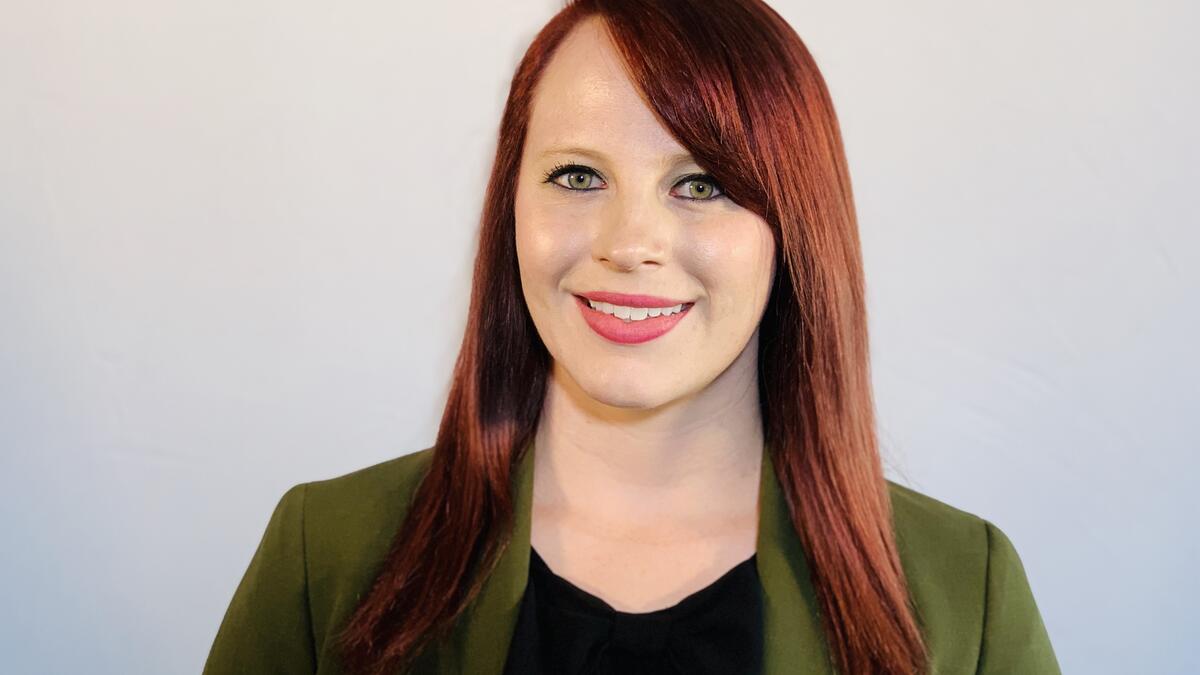ASU Thunderbird grad hopes to complete journey from small-town student to global business leader

Outstanding graduate Sierra Gullette is joining Amazon in a director role after winning Thunderbird’s Barton Kyle Yount Award
Sierra Gullette has always strived to make a positive impact on the world, even when she didn’t know exactly what that impact would be. Her desire to make a difference was fueled by exposure to different regions.
She saw the world at a young age, moving no less than 25 times. Gullette was first accepted to the ASU Thunderbird School of Global Management in 2015 but decided to go a different direction at the time. But when she was accepted to the school again in 2018, she didn’t hesitate to accept the offer.
Gullette is a member of Beta Gamma Sigma and the recipient of the Thunderbird Global Excellence Tuition Award – MGM, the Texas Alumni Scholarship, a university grant, and the TELC Student Experience Fund Award.
Gullette says that one of the highlights of her Thunderbird career was attending the Prospanica Career Fair in Orlando, Florida, in 2019 through the TELC Student Experience Fund Award where she made the most of the opportunity by lining up five interviews and earning three job offers. What she enjoyed most, however, was going on the trip with other T-birds and cheering each other on, sharing information about specific companies and praising each other with hiring managers.
In spite of the pandemic keeping people apart, Gullette feels she was still able to meet incredible people from around the world, learn from their cultures and dreams, and sit in the classrooms of top-notch professors.
“I am so lucky to be part of such a world-class school, alumni network and way of life,” she said. “The Thunderbird Mystique is alive and well!”
Question: What was your “aha!” moment, when you realized you wanted to focus on international business or decided your academic concentration?
Answer: I have actually had two “aha” moments, both involving Thunderbird. I have always been a fan of all things international. I traveled internationally with my parents when I was younger, visiting 11 countries before I was 15, and it made me fall in love with the food, cultures, people and places. My goal has always been to live and work overseas. When it came time for pursuing an undergraduate program, I wanted an international one but landed on a degree in finance since I thought a finance degree would be the most versatile. I found out about Thunderbird in 2014, right after graduating from the University of Texas at Tyler. I applied in 2015. Unfortunately, I could not make it at the time because I went to Army basic training. Sadly, I ended up breaking quite a few bones, coming home before I could graduate from basic. Once home, I continued to work for small- and medium-sized companies, where I was unable to work internationally in my job capacity. That is when I decided to come to Thunderbird for the second time. I knew it was the right fit for me to be able to live and work internationally, and I was at a point in my life where I had good work experience and was ready to make the leap.
Q: Why did you choose Thunderbird and ASU?
A: I chose Thunderbird and ASU because of everything they stand for. When I first found out about Thunderbird in 2014, I knew it would be perfect for what I hoped to achieve. I would be able to learn about all cultures, have friends from all over the world, learn cross-cultural communication, live and work overseas and learn practically, not just memorize chapters from a textbook for a test. I wanted to learn as much about leadership and management as possible so I could be the best leader possible in the future. I have had great leaders and ones with plenty of room to grow, and I want to be one of the greats. With Thunderbird being the No. 1 master’s in management, with a now 75-year incredible track record, over 45,000 alumni, world-class faculty and staff, and a dean who has really helped shape Thunderbird, it was a no-brainer. Thunderbird was the best decision I have ever made, hands down.
Q: What is the most important thing you learned from a professor or peer?
A: The most important thing I learned while at Thunderbird was from Professor Nicholas Davis. During his leadership class, he said, “Don’t confuse leadership and management. Most discipline issues are due to management failures. It is really important to have a management system as a new leader.” This is key to me because I struggled with my last management position. I was a supervisor without disciplinary responsibilities. I went from being best friends with my coworkers to supervising them, but really being the go-between for our boss and them. I was not effective and did not have a system put in place. After taking almost every leadership class at Thunderbird, and especially learning from Professor Davis, I now feel far more prepared for the future!
Q: What’s the best piece of advice you’d give to those still in school?
A: If you are currently an undergraduate, thinking of pursuing a master’s degree, you don’t have to go right into it. Everyone is different, but the work and life experience you will gain in the three to five-plus years you work post-undergraduate will be invaluable to you during graduate school. You will have the experience to apply the principles, learnings and examples to your life and career up to that point. You will also be more mature biologically and that makes a difference somehow. Plus, you will have less of a chance to feel burnt out from being in school for 18 years straight.
If you are currently in graduate school, you got this! Enjoy every second, read every article and case for class, put your best effort into it, and really soak up the time you have with people. I was fortunate enough to get a semester and a half with my classmates and that time was incredible. You will make lifelong friends during your program and may even find people to go into business with!
Q: What are your plans after graduation?
A: This summer I will be starting a job at Amazon, which I am beyond excited for! I will be in the Pathways Operations Program, which is a three to five-year rotational leadership program in a fulfillment center. I will finish the first two rotations in a U.S. fulfillment center in Kentucky. Since the program is global, I will then have the opportunity to spend the last two rotations overseas at a fulfillment center. I will start as an area manager, move to an operations manager, then senior operations manager and finally graduate at the director level, managing one large fulfillment center or a couple of smaller ones.
Farther down the line, I want to come back to Thunderbird to obtain my Doctor of Global Management degree and become a leadership consultant for executives and professionals moving into the C-Suite, but I’ll need to get quite a bit of experience under my belt first.
Q: What separated your time at ASU Thunderbird from your previous educational experiences?
A: My Thunderbird experience was very different from previous educational experiences. Growing up, I lived in places with little diversity — Cheyenne, Wyoming, and Fort Collins, Colorado — so traveling to other countries was the only way I could experience it. That is the reason I have been so enthralled with other cultures and driven to live and work overseas. I moved to east Texas for my undergraduate program and was excited to be able to meet people from other cultures, but since it was a small school in a small town, the diversity was still somewhat limited for what I was seeking. I was usually the one who had visited the most countries, states, etc. Thunderbird has been a complete 180-degree shift. I am now around more people from around the world, who came to Thunderbird from their home countries, have lived and worked in almost every country, and now I am one of the ones who has visited the least number of countries. Learning from everyone, seeing their perspective, listening to their remarkable ideas, studying what their culture is like, and making friends, has been beyond my wildest dreams. It also helps that our faculty, staff and students are all so alike in that we love to travel, we love to learn from others, we love to experience every culture, and we support Thunderbird’s saying, “Borders frequented by trade seldom need soldiers.”
Q: Have you noticed any changes in your personal life or perspective because of your ASU Thunderbird education?
A: I have changed more than I anticipated I would since coming to Thunderbird and ASU. I now know how to communicate and negotiate cross-culturally, have learned that collaboration and cross-cultural teams are far more important than I ever realized and that there are thousands of people who want similar things out of life that I do. I have personally grown and matured as well. Being around such a high caliber of people and learning leadership and global management skills has really helped me flourish. Each person I have met during my journey at Thunderbird has been inspiring. From the professors to the students, the staff and alumni, each person has their own unique story, but everyone is making an impact on the world and I am lucky to be one of them.
Q: What is something you wish people understood about globalization or international business?
A: I wish people understood that globalization and international business are not inherently bad. We learn in economics about comparative advantage. If I am better at growing bananas than you are, and you are better at producing dairy than I am, I grow bananas, you produce dairy and we trade. If everyone only lived off what they produce, we would have a very siloed, less productive world. There have been times when globalization has not been a great option and many people struggle with the idea of a factory leaving their country, but that is not always a bad thing. Promoting technology and resources, people, and goods and services across borders is more beneficial than detrimental most of the time. Without it, we would not have everything we have today, the ability to learn and experience other cultures, and have successful businesses sharing information, resources and transferring technology.
Q: If you had unlimited resources to tackle a global problem or otherwise improve people’s lives, what would you do?
A: After visiting Mexico, South Africa and most recently Belize, it pains me to see such poverty and oppression. I would love to keep with the Thunderbird model of opening business schools around the world. These schools would be far smaller than Thunderbird’s of course, but they would be places for men and women to learn more about business and grow their own businesses. Each school would have teachers from the local area as well as ex-pats who have worked in the area to give a global perspective. One thing that nobody can ever take away is education, and the more someone knows about business, the better chance they have to improve their life.
Written by Christina Furst, branding and communications coordinator
More Environment and sustainability

2 ASU faculty elected as AAAS Fellows
Two outstanding Arizona State University faculty spanning the physical sciences, psychological sciences and science policy have…

Homes for songbirds: Protecting Lucy’s warblers in the urban desert
Each spring, tiny Lucy’s warblers, with their soft gray plumage and rusty crown, return to the Arizona desert, flitting through…

Public education project brings new water recycling process to life
A new virtual reality project developed by an interdisciplinary team at Arizona State University has earned the 2025…

